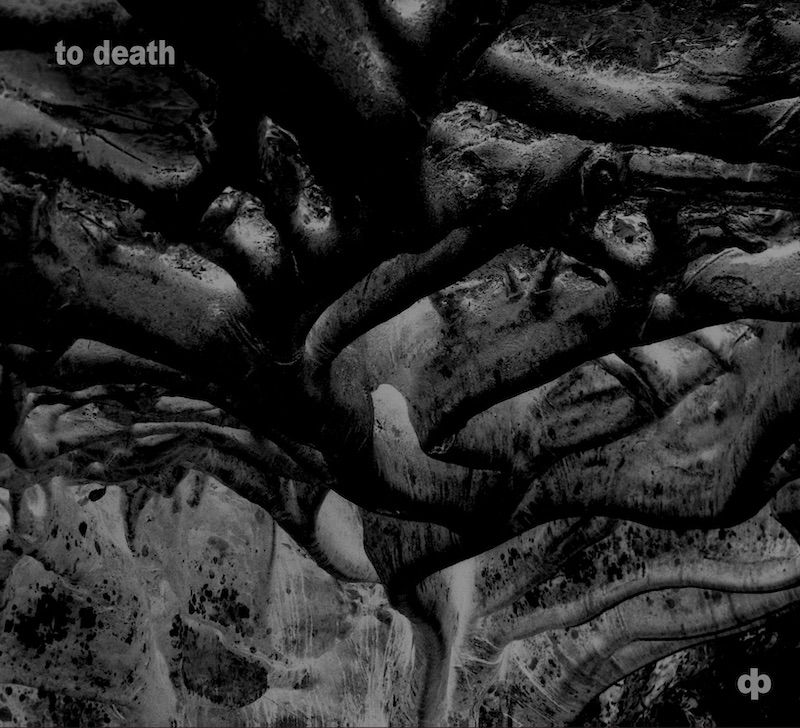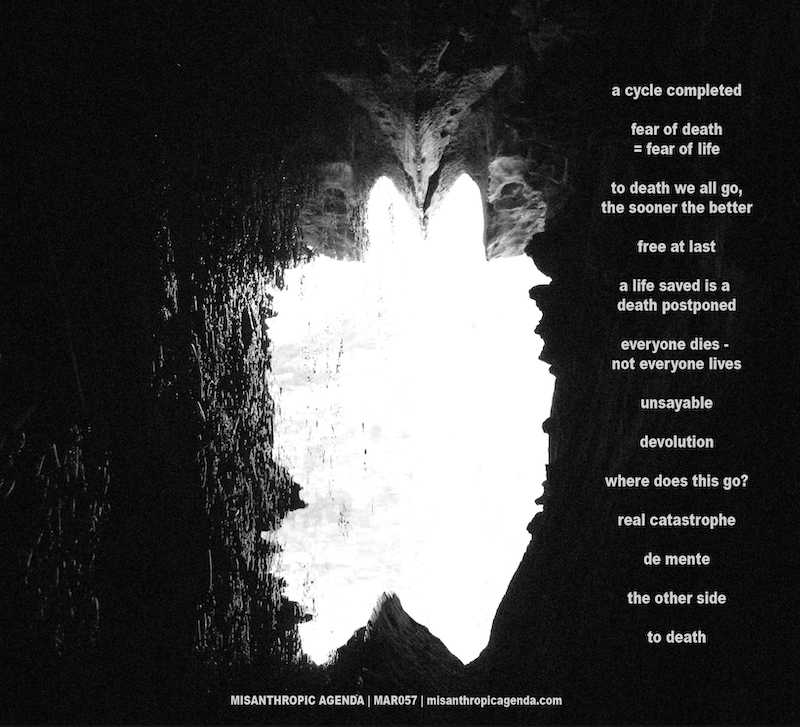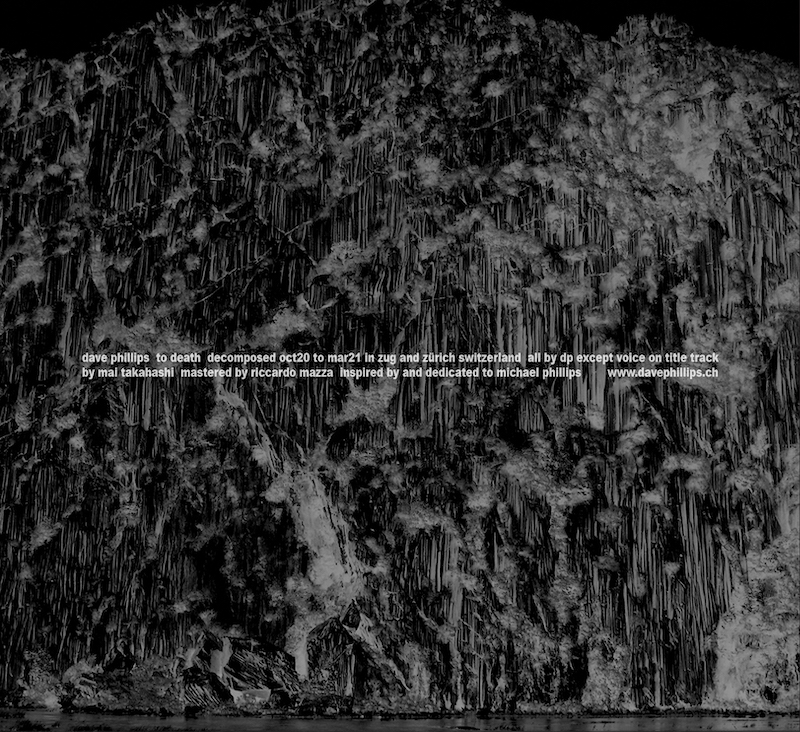


REVIEWS
Dave Philips es un activista sónico, compositor, intérprete e investigador que vive en Zurich, Suiza quien tiene numerosos trabajos en solitario, así como colaboración y miembro también de varias bandas como Schimpfluch-Gruppe desde 1991. Cofundador de Ohne en 2000, en solitario con el proyecto doom Dead Peni desde 2004, el dúo The Perverts in White Shirts desde 2012. Cofundador de Fear of God en 1987.
El álbum está inspirado en la muerte y según Phillips, “no se refiere a la muerte como el espectro que instala el horror y el miedo en muchos (en el mundo occidental)… sino a la muerte como parte de un ciclo, como el nacimiento. La muerte también es algo que puede ser una liberación, un alivio, una liberación, el fin del sufrimiento, una libertad“.
Para este disco Phillips cuenta como instrumentos su propio cuerpo, voz, grabaciones de campo, dispositivos electrónicos, objetos y video.
“To Death” nos adentra a un mundo en el que se evidencia la angustia a través de gritos despavoridos, golpes de objetos, manipulación de grabaciones de campo y ruidos generados electrónicamente. Ello remite a atmósferas oscuras, cuyos sonidos repetitivos alteran la psique y si bien se entiende que la muerte tiene aristas como la liberación y libertad, entre otras características, el miedo es una emoción omnipresente en todo este disco que atrapa por su magnetismo, a través de una voz que bordea el silencio junto a un espectral discurso.
This new album by Dave Phillips is “dedicated to death”. He writes: “I don’t mean death the spectre that installs horror and fear in many (in the western world), nor death the enemy of the (western) for-profit medical system, but death as part of a cycle, like birth. death is the only certainty in life. dying, like living, as something that can be done well - or not. death also something that can be a release, a relief, a liberation, the end of suffering, freedom.” Dedicated to his father, who died in June 2021, as this album went to press. The son took care of the father for the last fifteen months, and from October 2020 to March 2021, Phillips worked on this eighty-minute album. By now, Phillips has carved out a specific sound that one recognises as Dave Phillips. Well, at least I do now. The voice plays an important role; whispering, screaming, humming like a choir, or even reciting a text (in ‘Unsayable). Along with this are close-miked acoustic objects (shaking cups in ‘Unsayable’), a sampled cello, heavy percussion, a few piano tones and a hard cut to make a radical change in a piece. This time there seems an absence of field recordings, but maybe taking care of his father prevented Phillips from doing new ones? All of this one could call noise, but oddly enough, most of it is acoustic. Phillips creates a massive carpet of sound by layering many sounds, lots of voices here; a demented choir, a swirling mass of sound, abruptly cut short (like life sometimes) with a sudden percussive bang. Phillips is the man for precision editing, coming most of the time when you expect them least. Of course, this is not a pleasant album, even if you believe death is part of a cycle, followed by birth (I am not among those who think that). The result is dark music that makes you contemplate one’s existence on this mortal coil, and perhaps everybody you loved and who is no longer with you. Maybe that is not an unpleasant thought; thinking about loved ones makes them still with you and not entirely gone. I even believe there is meaning in the duration of this album, other than value for money; eighty minutes being the metaphor for an average life span? This is an excellent album, on par with Phillips output so far, of which I know not many I didn’t like.
(Frans de Waard, Vital Weekly, Issue 1299, August 2021)Dave Phillips продолжает исследовать пути для создания угрожающе мрачной атмосферы с помощью звука. Если в альбоме предыдущего года Post Homo Sapiens его задачей было выйти за рамки ощущений и затронуть в человеке его природную суть, то в этом он больше философствует насчёт нашей природы - жизни и смерти, что трогает слушателя даже сильнее.
Альбом был записан под влиянием сложившихся в жизни Dave Phillips обстоятельств: болезнь, ухудшение состояния и смерть отца исполнителя, а также тем, что он был его опекуном в течение последних 15 месяцев его жизни, как пишет он сам в описании альбома. У меня был похожий опыт в жизни, что тоже привело к выплеску эмоций в музыкальный проект (Рано или поздно покой наступит). Поэтому мне кажется близким настроение, присущее альбому.
Смерть содержиться в каждом из нас. Она придёт рано или поздно, спонтанно или нет. Жизнь суть обретение покоя и гармонии внутри себя с осознанием приближающегося нечто. Смерть придёт и наступит покой, наступит ничто.
Будоражащие нутро звуковые пассажи в сопровождении с устрашающими голосами доставляют довольно интересный опыт, который испытываешь не каждый день. Несмотря на огромную эмоциональную опору и большее звуковое разнообразие по сравнению с предыдущими работами, создаётся впечатление, что заложенная атмосфера передаётся слушателю не в полной мере. Возможно из-за недостающей полноты звука или, наоборот, из-за большой плотности эффектов в треке. В любом случае - это солидный релиз, отражающий переживания от непосредственного контакта автора со смертью.
There is dark, there is DARK, and there is PITCH BLACK. Compared to the sound of Dead Melodies mentioned above, To Death is pitch black, the darkest of dark imaginable. Maybe I should’ve been warned because the CD is released by a label called Misanthropic Agenda (what’s in a name). But, reading Dave Philips‘ liner notes, I expected something more ‘at peace’ with the inevitable: “This album is dedicated to death. I don’t mean death the spectre that installs horror and fear in many (in the western world), (…) but death as part of a cycle, like birth. Death the only certainty in life. Dying, like living, as something that can be done well – or not. Death also something that can be a release, a relief, a liberation, the end of suffering, a freedom.” The illness (and death) of his father, for whom he cared for the 15 last months of his life, inspired Philips to record this music. If the music represents these lasts months, it must’ve been a hard time for all. Knowing this background, listening to this album feels uncomfortably voyeuristic. Had I known more about the background of Dave Philips I would probably have been less surprised. As “a purveyor of radical sound” he has been active since the mid-’80s. He has appeared on over 250 releases, was one of the founders of the (now cult) group Fear Of God. Keywords on his site are “ritual protest music, sonic activism, humanimalism, psycho-acoustics” – you get the picture. I hope that his father died in relative peace and without too much suffering. But judging by the sound on this album, I’m more afraid it was a painful struggle. I’m afraid this music definitely won’t help you overcome your fear of death if you have any. If you’re looking for a soundtrack to your worst nightmare: look no further.
(ambientblog, July 2021)to death est une œuvre forte qui puise dans le concept de la mort, comme partie intégrante du cycle de la vie, s’enracinant dans la maladie, la détérioration et le décès du père de Dave Philips, qui a traduit la lente agonie de son ascendant. On ressent tout au long de to death, la douleur et le malaise qui s’insinuent dans l’espace, force invisible prenant possession de la chair et de l’esprit. L’ambiance noire ne laisse pas de place à la lumière, dark ambient cadenassée par la violence de la disparition d’un être cher, construite autour de field recordings et de nappes envahissantes, de cris sporadiques aux frontières d’un au-delà prêt à accueillir la dépouille inerte d’une existence évanouie. Dave Phillips transcende la mort pour lui offrir un visage aux reliefs vagues et oppressants, peur latente et inéluctable qui grave dans nos corps et nos esprits, la hantise de l’invisible et du mystérieux. to death effraye et attire comme un puits sans fond, étend ses souffles et ses respirations tels des racines profondes, s’ancrant dans un monde de brume et de brouillard, d’anxiété et de douleur, de vide et d’oubli. Vertigineux.
(Roland Torres, Silence and Sound, July 2021)The title of Dave Phillips’ new album is quite explicit: it’s an album dedicated to death. He explains this in the liner notes, ‘not death the spectre that installs horror and fear in many (in the western world), nor death the enemy of the (western) for-profit medical system, but death as part of a cycle, like birth. death the only certainty in life. dying, like living, as something that can be done well – or not. death also something that can be a release, a relief, a liberation, the end of suffering, a freedom.’
The album, which he directs the listener to play as one continuous session, was inspired by his father’s illness, deterioration and death, and being his carer for the 15 last months of his life, and was, poignantly, sent off to press in early June 2021, when his father died. This clearly makes To Death an incredibly personal work.
Perhaps predictably, To Death is a dark album. Predictably, not primarily because of the subject matter, but because my last encounter with Phillips’ work – 2014’s Homo Animalis – was pretty dark, too, although he’s done a hell of a lot since then. And for Phillips’ observation that death can be ‘a relief, a liberation, the end of suffering, a freedom’, death is rarely seen as a cause for elation or celebration in the human psyche, particularly in the west, where there is a deep-rooted fear of death, and a culture that promotes prolonging and preserving life at all costs, regardless of quality. Death is perceived as a loss, something devastating, and to be avoided at all costs, and I’m forever presented with news items and comments on social media about people who have died in their 70s or 80s – particularly during the pandemic – having been ‘taken before their time’. But when is their time? Everyone has a time, and everyone has to die of something, and the state of denial about the inevitability of death is psychologically detrimental.
But as the title of the album’s second track says it so succinctly, ‘fear of death = fear of life’. A life lived in fear of death is no life at all. Of course, an awareness of death is something else entirely. You have to take some risks to know you’re actually alive. How many people say on their death bed that they were glad they did nothing in case it killed them? There’s a clear theme to this album, both sonically and in the tiles: ‘everyone dies, not everyone lives’ is the perfect encapsulation of Phillips’ ethos. It also manifests as a dolorous booming drone like a ship’s horn juxtaposed with maniacal shouting, distorted and raw, and very much in the vein of Prurient. As such, Phillips articulates beyond words and reaches into the very core of the psyche.
Ominous drones that hum and buzz hover unsettlingly and uncomfortably, eddying around whispered words, barely audible during the ten-minute first track, ‘a cycle completed’. What is it about whispers in darkness that we find so unnerving? Gradually, ponderous bass notes and dubious creaking sounds enter the mix as the drones become more tense and eerie.
The third piece, ‘to death we all go, the sooner the better’ is filled with agonised shrieks and howls and pain and anguish – and the title conveys a sentiment I can truly buy into. Humanity is a scourge, and the worst of all plagues on the planet.
Listening to the album in a single sitting is certainly a powerful experience, and there is some dense, challenging noise, and things grow darker and doomier as the album progresses: a stark piano note chinks out and is quickly submerged in a wheezing drone and more muttered narrative on ‘real catastrophe’ which plunges deep into underground rumblings. ‘We are the virus…’ he whispers amidst a soup of spectral voices. ‘The real catastrophe is that humanity continues.’ Phillips’ apparent misanthropy is hardly unjustified: in the scheme of all eternity, it’s taken us but the blink of an eye to render countless species extinct and decimate countless ecosystems. In nature, other species don’t destroy their own habitat. Even viruses and parasites evolve to achieve maximum replication without destroying their hosts. It’s simply not in their interests. The common cold is the most successful virus of all time because it’s highly contagious but rarely kills its host, other than by complications. The more hosts available, the times it can reinfect, the less work it has to do to propagate itself.
Siren-wailing undulations lead us to ‘the other side’, a groaning, wheezing croak of a composition built on repetition before finally, the title track crawls to the finish – and having made it, I can die happy.
Some speculate that death is not the end, but the likelihood is that it is, and regardless of spiritual belief, physically, it is. And why should that be such a bad thing? All things must end, and it’s a matter of when, rather than if. Live life: accept death.